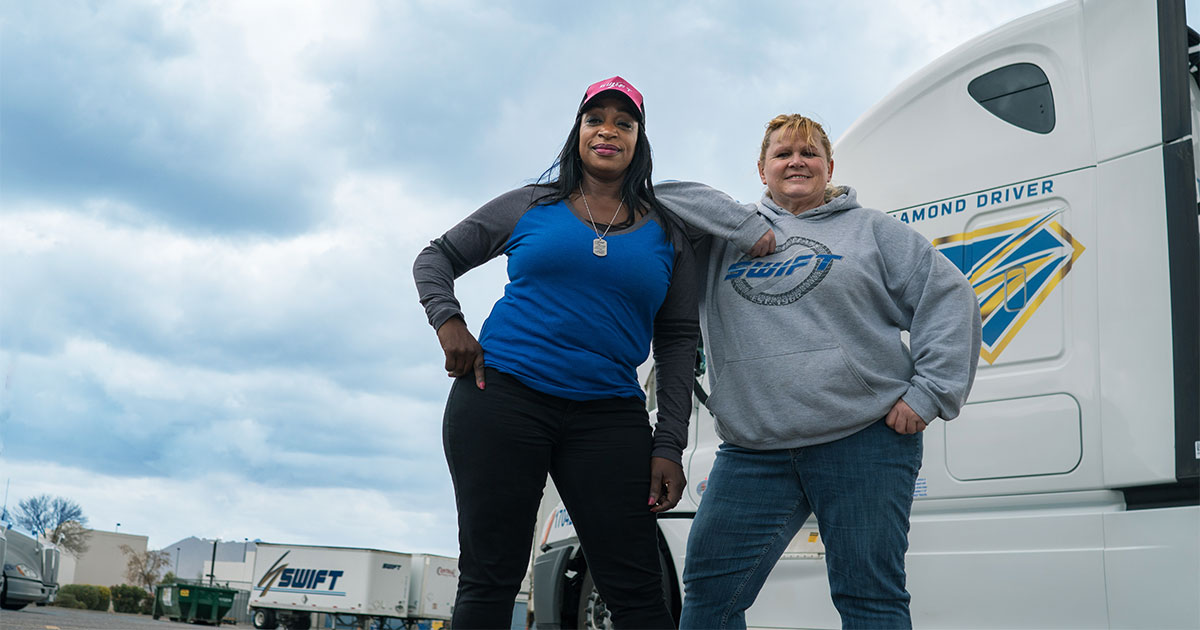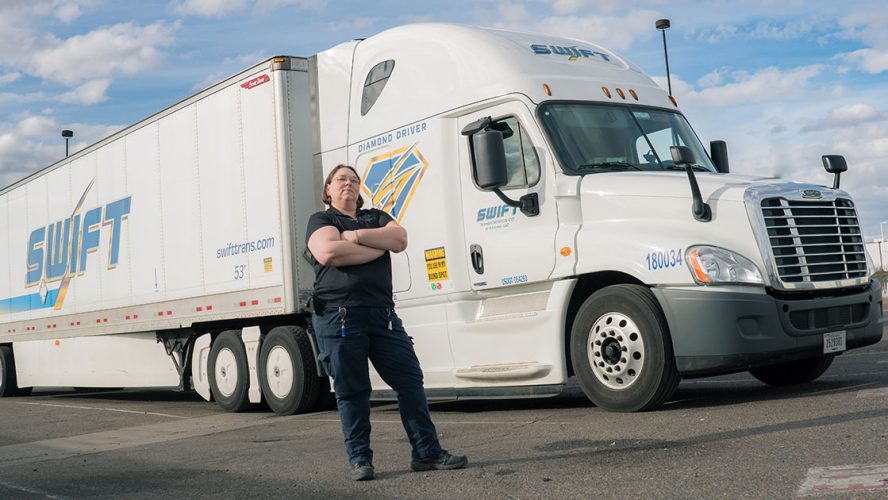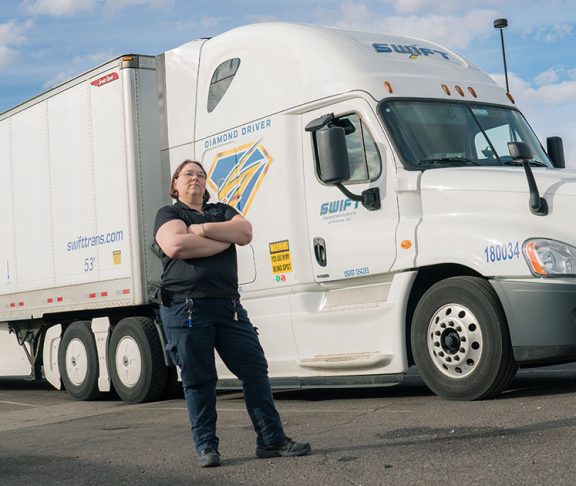When Elisha gets worked up at her job, she handles it like lots of people do: she squeezes her emoji stress ball. But unlike lots of people, Elisha’s job requires her to spend all day deftly maneuvering big rig.
Elisha is a Diamond Driver for Swift Transportation, a company which, since 1966, has grown into North America’s largest full-truckload carrier. Her Diamond designation is Swift’s highest honor, bestowed based on rigorous safety and service requirements, including number of miles driven and timeliness of deliveries.
Dreaming about big rigs
“I always wanted to drive something unique,” Elisha recalls. Before becoming a trucker, she bounced between jobs as a waitress, a cashier and a tax preparer. When she heard an ad on the radio for paid training near her home in Illinois, she jumped at the chance to finally hit the road. “I heard this advertisement and I knew it was my chance.”
When Anita started her career in trucking — 20 years ago this November — she was looking for a better solution for her family. “I was a single mother with three kids,” she shares. “I was working two jobs, going to school full time and only making $20,000 a year.” When she began driving, “everything clicked together.”
Ericka had a foot in the door because her older brother drove trucks, but she started out in warehouse work. “I just woke up one day and said, okay, I’m tired of driving the forklifts and loading these trucks. I’m ready to start driving them.”
Making it work
Each of the three women has carved out a unique path, both in the route they travel and their approach to “home time” — trucker jargon for time off. Anita covers “all 48,” and now that her kids are grown, she views time off differently. “I normally stay out for four to six weeks at a time and then take four to six days off,” she explains. “I can put a ZIP code in my home time screen and get home time any place across the country, so I get paid to drive to my next vacation location. It doesn’t get any better than that.”
Elisha is based out of the Gary, Indiana Terminal, and her “little area” includes Ohio, Michigan, Nebraska, North Dakota, South Dakota, Kansas and, every once in a while, Kentucky or Memphis. Last year, she spent 316 days on the road. “I can go home when I want to go home … I can set my schedule around me,” she says. But she also laughs that for her and her husband, the distance works. “It’s good not to be on top of each other all the time.” And though they aren’t in the same location, videochat keeps them connected. “We talk everyday, multiple times a day … I’m there even though I’m not there.”
Being a part of it all
In between home time is the thrill of a new adventure. For Elisha, the ever-changing destination is what makes her job so special. She tells a story of arriving early for a delivery in North Myrtle Beach, South Carolina. “I unhooked from the trailer and went down to the beach. I got to go out there and have some fun and splash in the ocean and see all of the little fish swimming in the surf.”

“Just to be a part of so many different things is what I love,” she says. “I can be a part of building a motel. I’ve been a part of helping build dorm rooms for a college down in Louisiana. Just to say, ‘I helped. I brought stuff to help build that,’ is so exciting to me.”
For Anita, each new state offers a new perspective. “It’s refreshing when you meet so many people who aren’t like you. It makes you a lot more tolerant. It makes you listen more and understand a little bit more about what people go through, the hardships and difficulties. It makes you appreciate your life more.”
And for Ericka, it’s all about that open road. “There are things that you cannot see unless you’re out here — things you can’t capture in a picture. Every time you think you’ve seen something so beautiful, you come across something that seems more beautiful.”
Finding the right employer
Though Elisha, Ericka and Anita all love their choice of career, they also make it clear that the job isn’t right for everyone. “It’s a lifestyle,” says Anita. “It consumes you.” Ericka seconds the sentiment, stressing that “trucking is not something you want to just wake up and say, I’m going to try that, that looks fun. You have to have a passion for it.” (And you really, really need to love to drive.)
All three women highlight the importance of finding an employer that cares about your wellbeing. When Elisha’s previous employer, who had leased their drivers to Swift, shut down unexpectedly, Swift “saved all of us,” she shares. “They were there to help us stay on our feet, not be without a paycheck and keep running. Swift is a lifesaver, I can tell you that.” When Ericka needed to take a few years off, she found that she was welcomed back. “Swift has always stood by me. There were times when I was going through a rough patch, and I’m still here. I don’t have plans of going anywhere else.”
Though their main goal, Anita suggests, “is to put good drivers on the road and to make it a career that you can sustain, they’re doing everything they can to make the possibilities for women exist.”
Giving 110 percent
“It’s good to see more women out here. Just in the last couple of years the numbers have skyrocketed,” Anita notes. She adds, “I think we’re more equipped to handle the life out here if it’s what we want. We tend to be a little less aggressive, a little more cautious, a little less angry.”
Despite positive trends, the fight for equity in the industry continues. “I think some men feel that this is a male-dominated field and should stay that way,” says Ericka. But as Elisha — who will celebrate a decade in the industry this October — points out, that just makes it all the more satisfying when she gets to prove the naysayers wrong, like when she’s in and out on a big delivery as male coworkers struggle behind. “It’s exciting when you get people like that, who then have to admit, ‘Wow, that was awesome.’”
“Yeah, I did it,” she tells them. “I’m a woman and I did it.”


